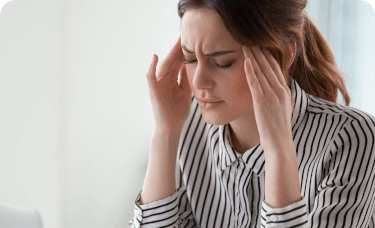Understanding and Managing Rebound Headaches.
While over-the-counter pain are helpful in improving headache pain, they must be taken with caution because they can make your headaches worse if they aren’t taken correctly. Medication overuse headaches or rebound headaches occur in a very small percentage of people who chronically exceed the recommended daily dose of pain relievers.1
In other words, headache sufferers may cause additional headaches by chronically taking medicine too frequently to treat an existing primary headache, such as a migraine or tension-type headache. Pre-emptive use of headache medicine is also a common factor.2 When medication wears off, the user can suffer a “rebound” headache, prompting them to take more medication. Taking more of the pain reliever to treat the new headache leads to progressively shorter periods of pain relief and often results in a recurrent pattern of chronic headaches.









